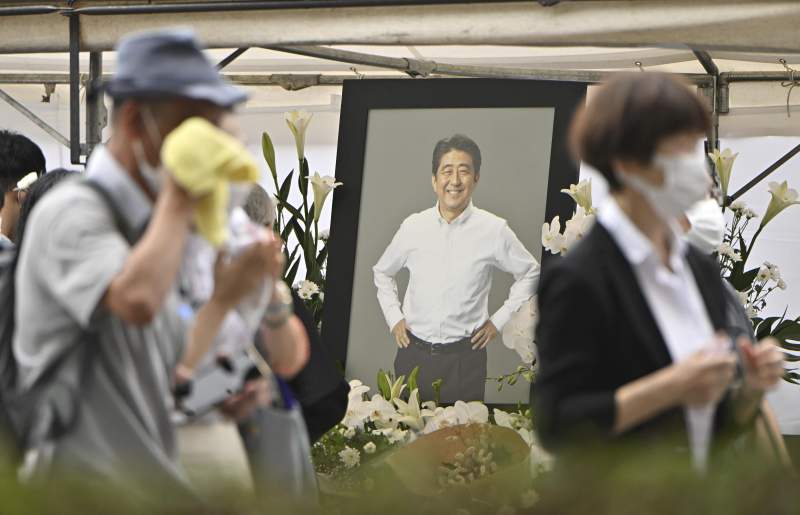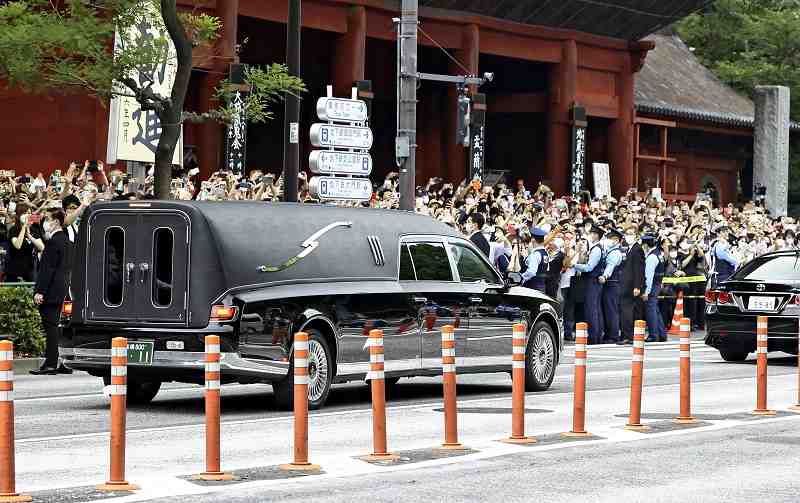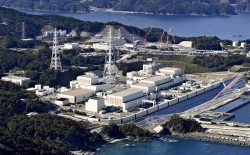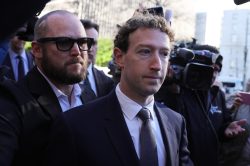
People offer flowers before a private funeral for former Prime Minister Shinzo Abe at Zojoji temple in Minato Ward, Tokyo, on Tuesday morning.
17:37 JST, July 15, 2022
An outpouring of condolences from both inside and outside Japan over the death of former Prime Minister Shinzo Abe contributed to Prime Minister Fumio Kishida’s decision to hold a government-sponsored state funeral for him.
Kishida said Thursday at a press conference that the government has decided to hold a state funeral for Abe in autumn. As for the reasons for holding such a funeral, whose cost is covered entirely by the government, Kishida pointed out that Abe had led Japan as the longest-serving prime minister in Japan’s constitutional history, serving for eight years and eight months, and that he made great achievements in recovery after the 2011 Great East Japan Earthquake, economic revitalization and diplomacy. Kishida also cited the high esteem with which Abe was regarded in the international community, including among national leaders, as well as the fact that he died in a sudden atrocity during an election campaign.
An ordinance on state funerals, which once served as the legal basis for state funerals of former prime ministers, expired in 1947. Kishida explained that the government would be able to hold a state funeral on the basis of the Establishment of the Cabinet Office Law, which stipulates that national ceremonies are under the jurisdiction of the Cabinet Office. Since a state funeral is held as a national ceremony, “the government can hold it on behalf of the country based on a Cabinet decision,” Kishida said.
The state funeral is expected to be held in September at the Nippon Budokan hall in Tokyo, according to government and ruling party sources.
Kishida’s strong will
It was Kishida’s strong desire to realize a state funeral, although some government officials expressed caution on legal grounds.
“[Abe] made such great achievements. He is highly valued by the international community, including foreign leaders,” Kishida said at the press conference.
His decision was welcomed in the Liberal Democratic Party.
“[Abe] has established a strong presence in the international community and has proven his achievements. A state funeral is only fitting,” Sanae Takaichi, chairperson of the LDP’s Policy Research Council, said.
At first, there was a view within the government that it would be difficult to arrange a state funeral. After the expiration of the prewar state funeral ordinance, there was a case in which a state funeral for Shigeru Yoshida was approved by the Cabinet in 1967.
However, the practice of a joint funeral held by the government and the LDP became mainstream after then Prime Minister Masayoshi Ohira died in office in 1980. There was concern that public criticism would arise if all funeral expenses were covered by state funds.
For this reason, the government was considering holding a joint funeral or holding a “national public funeral,” which is organized by the government, the LDP and members of the public, including members of the business community.

The hearse carrying former Prime Minister Shinzo Abe’s body leaves Zojoji, a temple in Minato Ward, Tokyo, after Abe’s funeral on Tuesday. Many people crowded along the sidewalk to pay their final tributes.
On the other hand, Kishida had a strong desire to hold a state funeral for Abe, who had made a great contribution to the country, and sought ways to realize it. Kishida was also encouraged by voices from those around him saying that a state funeral would be appropriate after many people flocked to Zojoji temple and the surrounding area in Tokyo during Abe’s private funeral.
The decision was also made in consideration of the Abe faction, which has 93 members, or about one-fourth of LDP Diet members. About an hour before Thursday’s press conference, Kishida’s side told senior members of Abe’s faction that the government had decided to hold a state funeral.
“The whole country paying tribute to Mr. Abe is what many people who supported him have wanted,” said Yasutoshi Nishimura, an executive member of the faction.
Opposition parties are paying close attention to the scale of the funeral.
Constitutional Democratic Party of Japan President Kenta Izumi said in a statement, “A state funeral is a solemn event, and we will pray and watch over it quietly.”
Japanese Communist Party secretariat head Akira Koike said, “We will take a close look at the whole picture to see what kind of content there will be.”
Ichiro Matsui, leader of Nippon Ishin no Kai (Japan Innovation Party), said: “I’m not against it, but I have some concerns. Not everyone is in favor of a grand funeral.”
Top Articles in Politics
-

Japan PM Takaichi’s Cabinet Resigns en Masse
-

Sanae Takaichi Elected 105th Prime Minister of Japan; Keeps All Cabinet Appointees from Previous Term
-

Japan’s Govt to Submit Road Map for Growth Strategy in March, PM Takaichi to Announce in Upcoming Policy Speech
-

LDP Wins Historic Landslide Victory
-

LDP Wins Landslide Victory, Secures Single-party Majority; Ruling Coalition with JIP Poised to Secure Over 300 seats (UPDATE 1)
JN ACCESS RANKING
-

Japan PM Takaichi’s Cabinet Resigns en Masse
-

Japan Institute to Use Domestic Commercial Optical Lattice Clock to Set Japan Standard Time
-

Israeli Ambassador to Japan Speaks about Japan’s Role in the Reconstruction of Gaza
-

Man Infected with Measles Reportedly Dined at Restaurant in Tokyo Station
-

Man Infected with Measles May Have Come in Contact with Many People in Tokyo, Went to Store, Restaurant Around When Symptoms Emerged




















